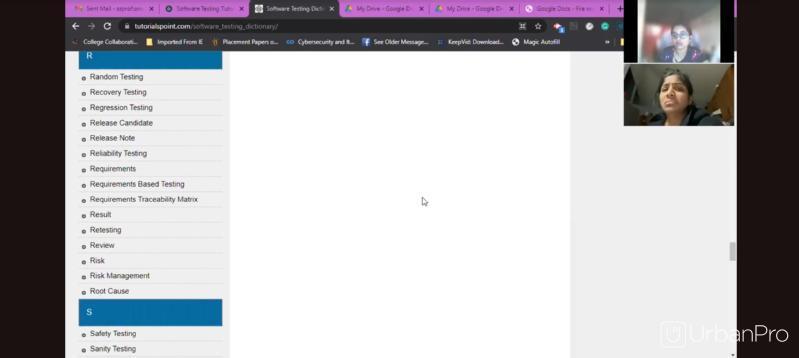
Jail Road, Indore, India - 452001.
Verified 3 yrs of Exp
32
Details verified of Smriti S.✕
 Identity
Identity
 Education
Education
Know how UrbanPro verifies Tutor details
Identity is verified based on matching the details uploaded by the Tutor with government databases.


Hindi Mother Tongue (Native)
Marathi Mother Tongue (Native)
English Proficient
![]() VIT university 2016
VIT university 2016
Master of Computer Applications (M.C.A.)
 Universal Informatics 2011
Universal Informatics 2011
C, C++
 Universal Informatics 2012
Universal Informatics 2012
Core Java
Jail Road, Indore, India - 452001
![]() ID Verified
ID Verified
![]() Education Verified
Education Verified
![]() Phone Verified
Phone Verified
![]() Email Verified
Email Verified
M
MKHS Gujarati Girls Collage
Siyaganj, Indore
Report this Profile
Is this listing inaccurate or duplicate? Any other problem?
Please tell us about the problem and we will fix it.
Class Location
![]() Online class via Zoom
Online class via Zoom
![]() Student's Home
Student's Home
![]() Tutor's Home
Tutor's Home
Years of Experience in Manual Testing Training
3
Class Location
![]() Online class via Zoom
Online class via Zoom
![]() Student's Home
Student's Home
![]() Tutor's Home
Tutor's Home
Years of Experience in Software Testing classes
3
Training offered
Cucumber
Training for ISTQB certification
No
Testing Types
Manual Software Testing, Automated Software Testing
Teaching Experience in detail in Software Testing classes
I am a Software Testing trainer with 3 years of teaching experience, specializing in both Manual and Automation Testing. I provide practical, real-time training based on industry practices to help students and professionals build strong foundations and job-ready skills. In Manual Testing, I cover SDLC, STLC, test case writing, defect lifecycle, and various testing types like functional, regression, smoke, and UAT. I also guide students in using tools like Jira, TestRail, and Bugzilla for real-world defect management. In Automation Testing, I offer in-depth training on Selenium WebDriver with Java, TestNG, Maven, and POM framework development. I also teach API testing using Postman and basic CI/CD practices using Jenkins and GitLab for automated testing pipelines. My sessions are interactive and tailored to each student’s pace, including live projects, assignments, interview preparation, and mock tests. I’ve successfully mentored over 150 learners, many of whom are now working in reputed IT companies. I aim to deliver not just theoretical concepts but also real-time project experience to bridge the gap between learning and working in the software testing field.
Upcoming Live Classes
5 out of 5 6 reviews
Mansi Kishorey
"She has taught me every topic from the basics to the advance. Even have cleared all the doubts i was having alot of times and i have learnt all the things very easily and nicely from her. "
Mandakini Rastogi
C Language
"Since I met Smriti, she is a great tutor, she explains all the concept of C language with the set of examples and brief logics.It was very easy to learn and practice C LABS using on daily communication. "
Reply by Smriti Solegaonkar
Thanks for your feedback.
Hasni Rao
"She is excellent in teaching and also clearing the doubts. Way of teaching helps in understanding the concept really well. "
Reply by Smriti Solegaonkar
Thank you so much
Chetna
Manual Testing
"She has more than 3 years of experience in manual testing projects that reflects in her teaching techniques and covering every small detail about the topic. I had a great experience and enjoyed a lot throughout the sessions and happy to made an addition in my skills set. Thank you Smriti for the wonderful sessions. Highly recommended. Go for it guys. And enhance your skill set too."
Reply by Smriti Solegaonkar
Happy to hear that, thanks
1. Which classes do you teach?
I teach Manual Testing and Software Testing Classes.
2. Do you provide a demo class?
Yes, I provide a free demo class.
3. How many years of experience do you have?
I have been teaching for 3 years.
Answered on 17/04/2025 Learn IT Courses/Programming Languages/C Language
In C, # is the preprocessor directive symbol.
It tells the compiler to process instructions before actual compilation. Common examples:
#include – includes header files
#define – defines constants or macros
#if, #ifdef, #endif – conditional compilation
Answered on 17/04/2025 Learn IT Courses/Programming Languages/C Language
Why: Core to storing and manipulating data; forms the foundation of any program.
Why: Essential for performing arithmetic, logical, and comparison operations in expressions.
if, switch, loops)Why: Enables decision-making and repetition — the backbone of logic flow.
Why: Promotes reusability, modularity, and cleaner code.
Why: Allows storing multiple values in a single variable — essential for loops and data processing.
Why: Key to understanding memory management, arrays, and functions in C.
Why: String manipulation is vital in user input, file handling, and text processing.
Why: Lets you group different types of data; important for real-world data modeling.
Why: Crucial for reading/writing data persistently outside the program.
Why: Enables flexible memory usage for efficient programming (e.g., creating variable-sized structures).
Answered on 17/04/2025 Learn IT Courses/Programming Languages/C Language
Why it's tough: Requires understanding of memory addresses, dereferencing, and pointer arithmetic, which are abstract and error-prone for beginners.
malloc, calloc, free)Why it's tough: Involves manual memory management; mistakes can lead to memory leaks or crashes.
Why it's tough: Adds an extra layer of indirection, making it confusing to visualize and debug.
Why it's tough: Mixing user-defined data types with pointers increases complexity in memory handling and data access.
Why it's tough: Syntax is tricky, and understanding how functions can be passed or referenced like variables is abstract.
Why it's tough: Logical thinking is required to trace function calls, especially for deeply nested recursive solutions.
Why it's tough: Involves low-level binary operations that require understanding of bitwise logic and masking.
Why it's tough: Includes working with file pointers and modes, and handling edge cases like file access errors.
Answered on 17/04/2025 Learn IT Courses/Programming Languages/C Language
✅ Best for beginners and intermediates
Built-in GCC compiler (or can be configured)
Lightweight, customizable, and open-source
Easy project setup and debugging support
A classic choice for students learning C
Fast and lightweight
Includes the TDM-GCC compiler
✅ Best for professionals and large projects
Full-featured IDE with IntelliSense, debugging, and GUI tools
Supports C via the MSVC compiler
Heavier than others but highly powerful
Open-source and flexible
Good for those familiar with Eclipse (Java, C++, etc.)
Requires separate GCC setup (MinGW or Cygwin)
Answered on 18/07/2020 Learn IT Courses/Programming Languages/Python/Python 3.8
Class Location
![]() Online class via Zoom
Online class via Zoom
![]() Student's Home
Student's Home
![]() Tutor's Home
Tutor's Home
Years of Experience in Manual Testing Training
3
Class Location
![]() Online class via Zoom
Online class via Zoom
![]() Student's Home
Student's Home
![]() Tutor's Home
Tutor's Home
Years of Experience in Software Testing classes
3
Training offered
Cucumber
Training for ISTQB certification
No
Testing Types
Manual Software Testing, Automated Software Testing
Teaching Experience in detail in Software Testing classes
I am a Software Testing trainer with 3 years of teaching experience, specializing in both Manual and Automation Testing. I provide practical, real-time training based on industry practices to help students and professionals build strong foundations and job-ready skills. In Manual Testing, I cover SDLC, STLC, test case writing, defect lifecycle, and various testing types like functional, regression, smoke, and UAT. I also guide students in using tools like Jira, TestRail, and Bugzilla for real-world defect management. In Automation Testing, I offer in-depth training on Selenium WebDriver with Java, TestNG, Maven, and POM framework development. I also teach API testing using Postman and basic CI/CD practices using Jenkins and GitLab for automated testing pipelines. My sessions are interactive and tailored to each student’s pace, including live projects, assignments, interview preparation, and mock tests. I’ve successfully mentored over 150 learners, many of whom are now working in reputed IT companies. I aim to deliver not just theoretical concepts but also real-time project experience to bridge the gap between learning and working in the software testing field.
Answered on 17/04/2025 Learn IT Courses/Programming Languages/C Language
In C, # is the preprocessor directive symbol.
It tells the compiler to process instructions before actual compilation. Common examples:
#include – includes header files
#define – defines constants or macros
#if, #ifdef, #endif – conditional compilation
Answered on 17/04/2025 Learn IT Courses/Programming Languages/C Language
Why: Core to storing and manipulating data; forms the foundation of any program.
Why: Essential for performing arithmetic, logical, and comparison operations in expressions.
if, switch, loops)Why: Enables decision-making and repetition — the backbone of logic flow.
Why: Promotes reusability, modularity, and cleaner code.
Why: Allows storing multiple values in a single variable — essential for loops and data processing.
Why: Key to understanding memory management, arrays, and functions in C.
Why: String manipulation is vital in user input, file handling, and text processing.
Why: Lets you group different types of data; important for real-world data modeling.
Why: Crucial for reading/writing data persistently outside the program.
Why: Enables flexible memory usage for efficient programming (e.g., creating variable-sized structures).
Answered on 17/04/2025 Learn IT Courses/Programming Languages/C Language
Why it's tough: Requires understanding of memory addresses, dereferencing, and pointer arithmetic, which are abstract and error-prone for beginners.
malloc, calloc, free)Why it's tough: Involves manual memory management; mistakes can lead to memory leaks or crashes.
Why it's tough: Adds an extra layer of indirection, making it confusing to visualize and debug.
Why it's tough: Mixing user-defined data types with pointers increases complexity in memory handling and data access.
Why it's tough: Syntax is tricky, and understanding how functions can be passed or referenced like variables is abstract.
Why it's tough: Logical thinking is required to trace function calls, especially for deeply nested recursive solutions.
Why it's tough: Involves low-level binary operations that require understanding of bitwise logic and masking.
Why it's tough: Includes working with file pointers and modes, and handling edge cases like file access errors.
Answered on 17/04/2025 Learn IT Courses/Programming Languages/C Language
✅ Best for beginners and intermediates
Built-in GCC compiler (or can be configured)
Lightweight, customizable, and open-source
Easy project setup and debugging support
A classic choice for students learning C
Fast and lightweight
Includes the TDM-GCC compiler
✅ Best for professionals and large projects
Full-featured IDE with IntelliSense, debugging, and GUI tools
Supports C via the MSVC compiler
Heavier than others but highly powerful
Open-source and flexible
Good for those familiar with Eclipse (Java, C++, etc.)
Requires separate GCC setup (MinGW or Cygwin)
Answered on 18/07/2020 Learn IT Courses/Programming Languages/Python/Python 3.8

Reply to 's review
Enter your reply*
Your reply has been successfully submitted.
Certified
The Certified badge indicates that the Tutor has received good amount of positive feedback from Students.